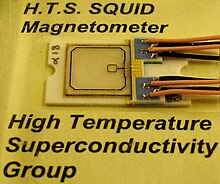
Back SQUID Catalan SQUID Czech Dc-squid Danish SQUID German SQUID Spanish Ülijuhtiv kvantinterferomeeter ET اسکوئد FA SQUID French Feiste fhorsheoltach trasnaíochta candamaí GA סקוויד HE

A SQUID (superconducting quantum interference device) is a very sensitive magnetometer used to measure extremely weak magnetic fields, based on superconducting loops containing Josephson junctions.
SQUIDs are sensitive enough to measure fields as low as 5×10−18 T with a few days of averaged measurements.[1] Their noise levels are as low as 3 fT·Hz−1⁄2.[2] For comparison, a typical refrigerator magnet produces 0.01 tesla (10−2 T), and some processes in animals produce very small magnetic fields between 10−9 T and 10−6 T. SERF atomic magnetometers, invented in the early 2000s are potentially more sensitive and do not require cryogenic refrigeration but are orders of magnitude larger in size (~1 cm3) and must be operated in a near-zero magnetic field.
- ^ Ran, Shannon K’doah (2004). Gravity Probe B: Exploring Einstein's Universe with Gyroscopes (PDF). NASA. p. 26. Archived (PDF) from the original on 16 May 2008.
- ^ D. Drung; C. Assmann; J. Beyer; A. Kirste; M. Peters; F. Ruede & Th. Schurig (2007). "Highly sensitive and easy-to-use SQUID sensors" (PDF). IEEE Transactions on Applied Superconductivity. 17 (2): 699–704. Bibcode:2007ITAS...17..699D. doi:10.1109/TASC.2007.897403. S2CID 19682964. Archived from the original (PDF) on 19 July 2011.